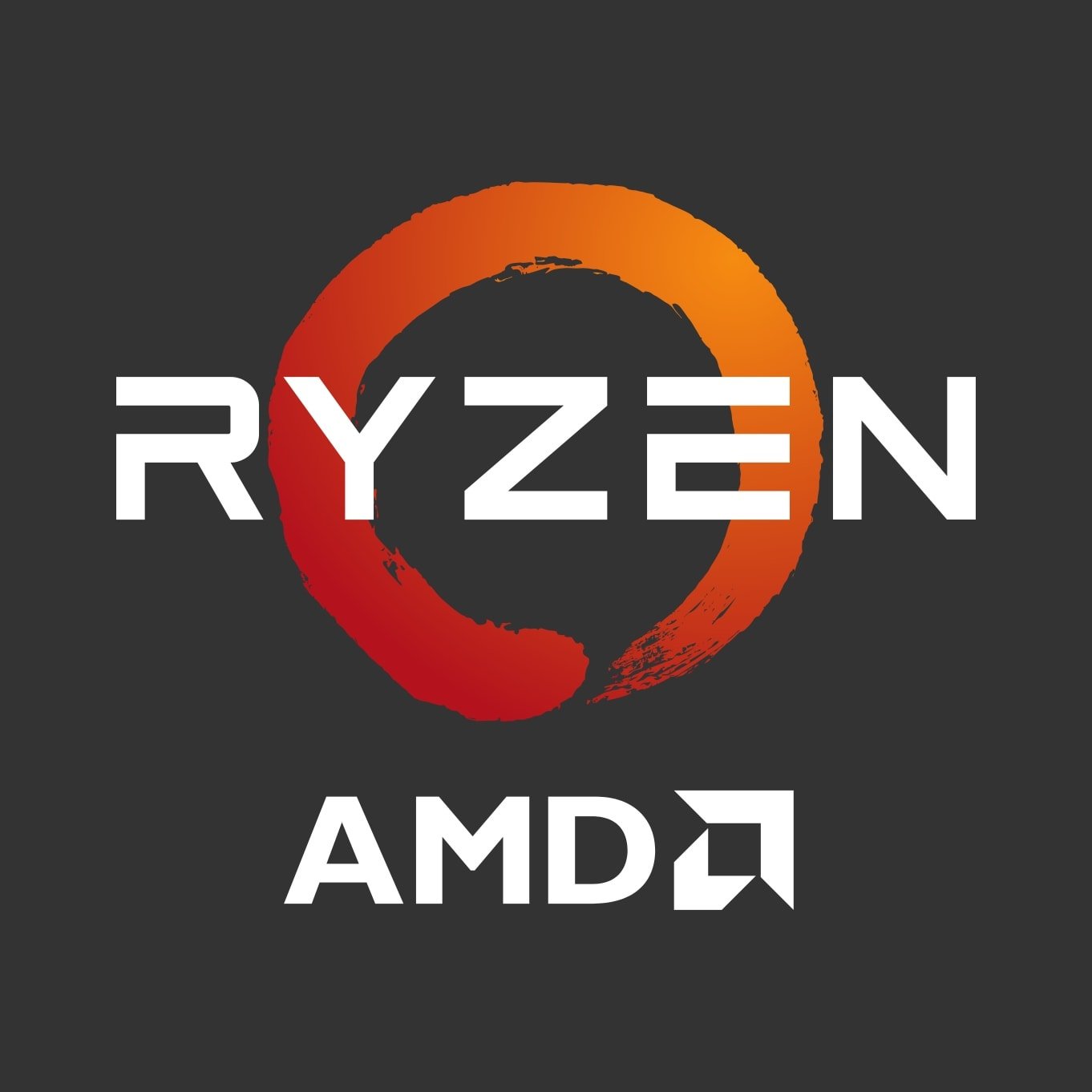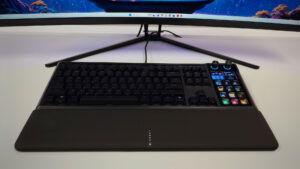When AMD launched its Zen 5 CPUs, there was a lot to like about their performance and efficiency. However, in gaming, they lagged behind the Zen 4-based 7800X3D. Thankfully, for anyone who has been holding out for the Zen 5 X3D chip, it is finally here with the AMD Ryzen 7 9800X3D, and it’s an impressive offering. AMD claims significant performance boosts for gaming, and after extensive testing, we have to agree. The AMD 9800X3D CPU is hands down the best gaming CPU we have ever tested, and the improvements make it an absolute monster for any kind of gaming.
Beyond that, it is generally a fantastic processor. For anyone looking for their next PC upgrade, few parts deliver a better slate of improvements than a Zen 5 PC with the AMD Ryzen 7 9800X3D at its core. It builds on the new features that made Zen 5 a step forward in x86 computing and combines them with the 3D V-Cache, which has proven to be a strong addition for gaming. Going into this review, barring any unexpected issues with the chip, I expected the 9800X3D to be solid and at least match the 7800X3D’s performance. However, AMD managed to exceed my expectations, delivering something easy to recommend.

Before diving into our testing, it’s worth examining what’s new with Zen 5. The architecture introduces a true 512-bit data path for AVX-512 operations, moving away from the “double-pumped” 256-bit implementation found in Zen 4. This advancement allows for substantially improved throughput while maintaining full-frequency processing capabilities.
“The AMD 9800X3D CPU is hands down the best gaming CPU we have ever tested, and the improvements make it an absolute monster for any kind of gaming.”
The architecture demonstrates impressive gains in instructions per cycle (IPC), with AMD reporting a 16 percent improvement over Zen 4. This enhancement stems from several key architectural changes, including an upgrade to eight dispatch/retire units from Zen 4’s six and an increase from four to six arithmetic logic units in the core.
Perhaps most notably, Zen 5’s power efficiency shows remarkable improvement. Built on TSMC’s 4nm process, the architecture achieves significantly better performance-per-watt metrics, with AMD claiming up to 22 percent gains over its predecessor. This efficiency is particularly evident in AVX-512 workloads, where the Ryzen 9 9950X consumes only marginally more power with AVX-512 enabled (205.19 watts) compared to disabled (203.94 watts).

The AMD Ryzen 7 9800X3D represents a significant evolution in gaming processor design, featuring AMD’s innovative second-generation 3D V-Cache technology. This 8-core, 16-thread processor operates at a base clock of 4.7 GHz and boosts up to 5.2 GHz, marking a substantial improvement over its predecessor’s 4.2 GHz base and 5.0 GHz boost clocks. What sets the 9800X3D apart is its revolutionary cache design. The processor features 104MB of total cache, with 64MB dedicated to 3D V-Cache, now positioned beneath the processor cores rather than above them.
“What sets the 9800X3D apart is its revolutionary cache design.”
As mentioned, there is a change in how the 3D V-Cache works in the 9800X3D, making it a more advanced offering that improves on an already impressive design. The second-generation implementation features a significant architectural change, with the 64MB cache memory now positioned beneath the processor rather than above it. This repositioning brings the core complex die closer to the cooling solution, enabling better thermal management and higher sustained clock speeds.
The practical impact of this design is substantial for gaming performance. AMD claims the 9800X3D brings up to 8 percent better gaming performance compared to its predecessor and up to 20 percent faster performance than competing processors. More importantly, this architecture shows particular strength in maintaining smooth gameplay, as evidenced by significant improvements in minimum frame rates.

As with previous AMD Zen 5 reviews, we set up everything on our test bench to ensure there was nothing that could skew the results. We wanted to use the best possible components for testing, so we paired the 9800X3D with an ASUS ROG Crosshair X870E Hero motherboard, 32GB of DDR5-6000 EXPO memory supplied by AMD, a Samsung 990 Pro Gen4 1TB M.2 SSD, a 1000-watt Gigabyte PSU, and a be quiet! Dark Base Pro 901 PC case, paired with an AMD Radeon RX 7900 XTX.
As we do with every test, the test system runs the latest Windows 11 update with up-to-date drivers and AMD software to ensure optimal performance. This configuration allowed us to evaluate the Ryzen 7 9800X3D thoroughly. AMD also provided an updated chipset driver for these tests, designed to optimize gaming results by leveraging the Windows process priority assignment suite.
As with our past reviews of Zen 5, we want to make a quick note about the chip driver: to get the best results, we recommend fully removing your current chip driver, restarting, and then installing the latest driver. Not doing this can result in improper installation, potentially reducing the CPU’s overall performance. Another quick note: while we perform a series of synthetic benchmarks to generate some of our data, the real-world tests provide a complete picture of where the CPU fits in today’s tech landscape.
Synthetic Benchmark
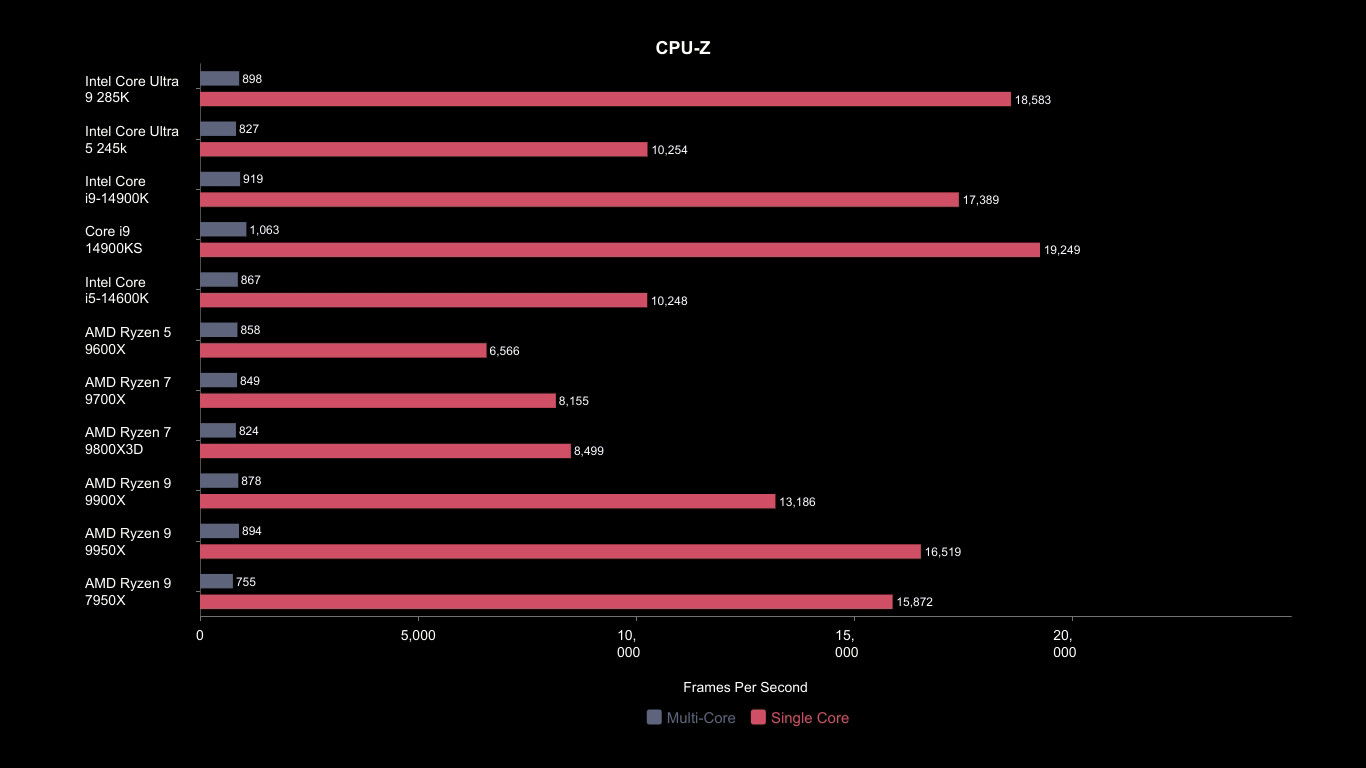
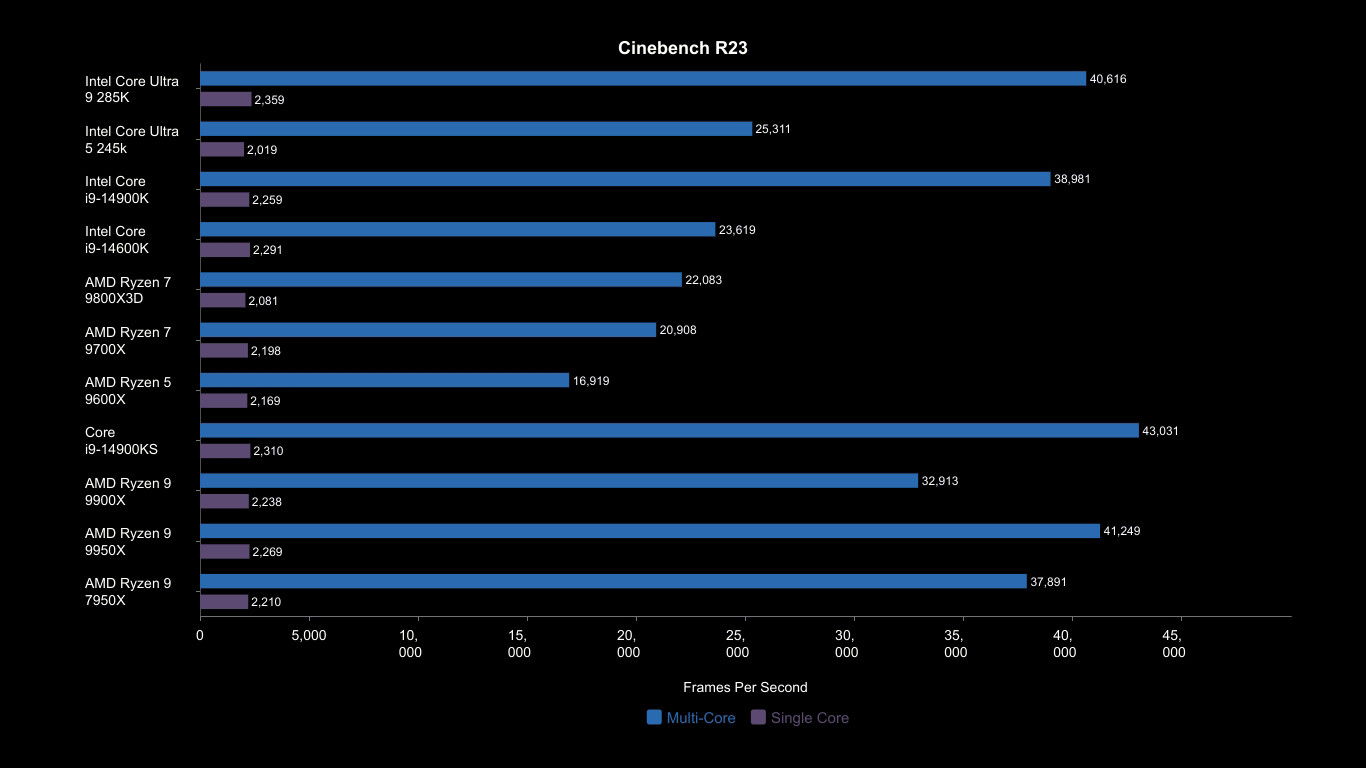
Starting with our synthetic benchmarks, the Ryzen 7 9800X3D performs as expected for an enthusiast CPU. It sits just above the Ryzen 7 9700X but behind the Ryzen 9 9900X. While the 3D V-Cache delivers impressive performance in gaming, it doesn’t provide synthetic performance that allows it to outperform more powerful CPUs or those with greater raw performance. That said, the numbers indicate solid performance across various workflows, making it suitable for work, productivity tasks, and gaming. However, it’s when we dive into gaming that we see why the 3D V-Cache truly stands out and why so many builders were holding out for this chip.
Gaming Benchmark
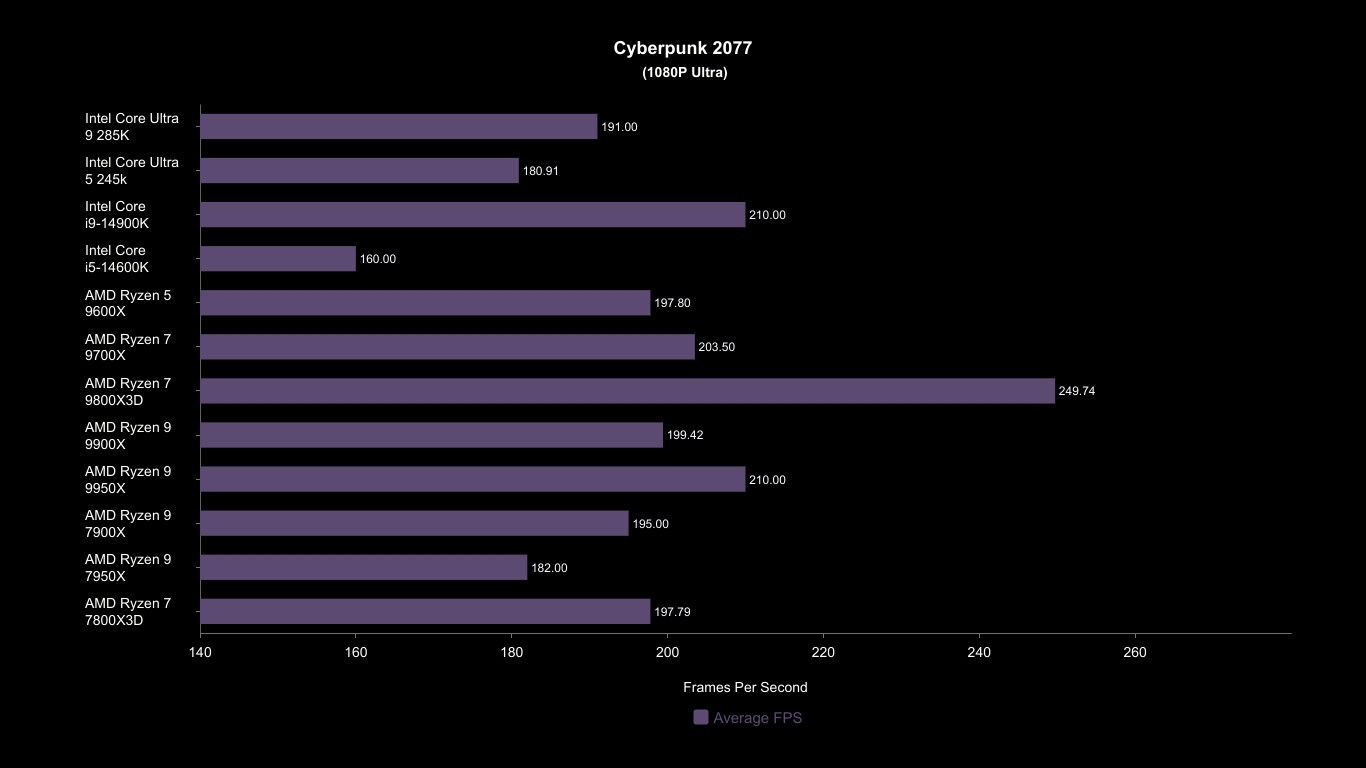
While the synthetic benchmarks aligned with the chip’s specs, it is the gaming performance that truly stands out. Starting with Cyberpunk 2077, the results are incredibly impressive. So much so that we double-checked our findings across multiple tests. Even after that, Cyberpunk delivered a staggering 249.74 FPS at the default ultra settings, placing it well above all other AMD Zen 5 CPUs by a wide margin. It also managed to outperform all Intel chips, scoring over 17 percent higher than even the i9-14900K.


Turning to Hitman 3, we see a similar story, with the Ryzen 7 9800X3D pulling well ahead of all other current-gen CPUs and delivering the best scores we’ve seen in our tests. The Dartmoor test is excellent for assessing a CPU’s performance across various workloads. Paired with the AMD Radeon 7900 XTX, as with all our tests, it gives us a clear picture of how effectively the V-Cache enhances gaming performance. We saw similar results in our Watch Dogs: Legion tests, where the Ryzen 7 9800X3D delivered an impressive 243 FPS—a solid 17 percent boost over the next best score, last generation’s Ryzen 7 7800X3D. This is welcome news for those who were on the fence about upgrading.

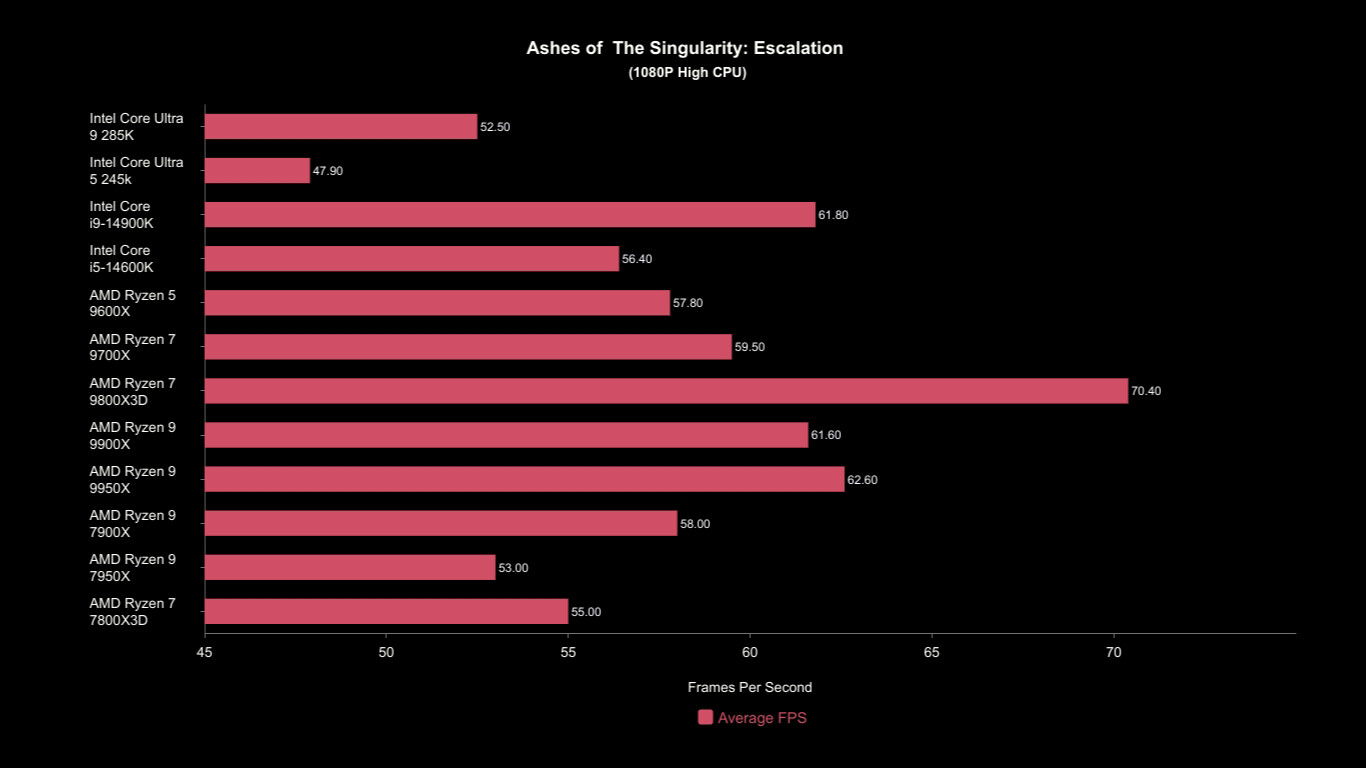
The story remains consistent across the rest of our game benchmark suite. The Ryzen 7 9800X3D delivered excellent results in Total War: Warhammer 3, achieving 234.40 FPS on ultra settings, compared to 192.30 FPS from the Ryzen 7 7800X3D and the Intel Core Ultra 9 285K. The 9800X3D more than held its own. While it didn’t perform as strongly in our 1080p low benchmark, it still managed to beat out every other chip in the Zen 5 range, including the higher-spec 9950X. Ashes of the Singularity: Escalation tells a similar story, with the Ryzen 7 9800X3D dominating the charts, delivering the best score of any chip we’ve tested, scoring a staggering 70.40 FPS, with only the 9950X coming close at 62.80 FPS.

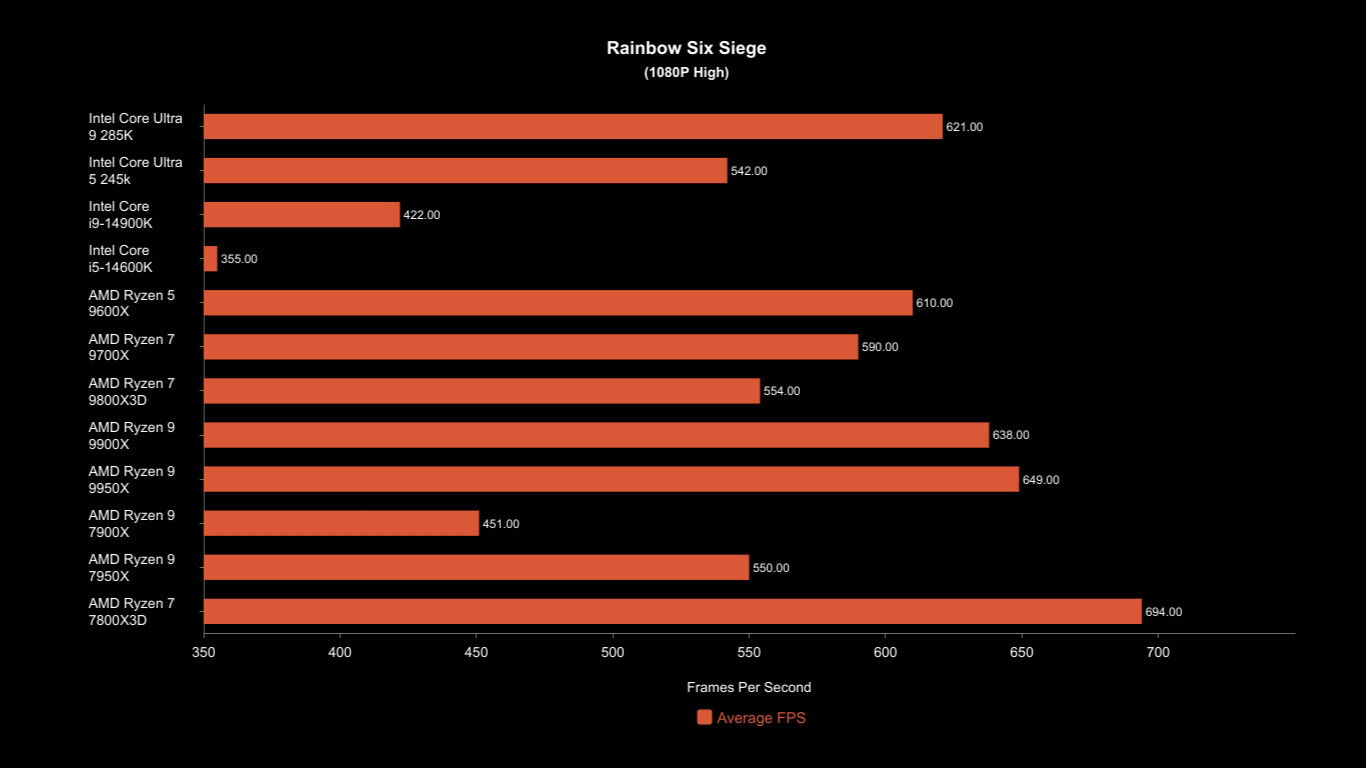
Not everything was a knockout win for the Ryzen 7 9800X3D; we did see some results fall lower than expected. In Rainbow Six Siege, it scored only 554 FPS, lower than even the 7800X3D. We reran the test several times to ensure accuracy. There could be reasons for the discrepancy, though, considering most users will never see anywhere near 500, let alone 600 FPS; this is more of a vanity metric than one an average player needs to worry about. Assassin’s Creed Valhalla did not show much improvement over other Zen 5 chips, and it fell behind the 7800X3D in this test, too, although the difference was only 3 FPS—something most people would find indistinguishable.
Performance & Creative Software
As with the other Zen 5 chips, the Ryzen 7 9800X3D includes built-in Radeon graphics, enabling it to handle AV1 encoding and reduce the GPU’s workload in rendering and production tasks. While its graphical performance is limited—making it unsuitable for gaming or intensive editing—this feature provides a way to test your system without a GPU. Additionally, the ability to offload some of the heavy lifting can free up more power for tasks content creators often need, especially for streaming and rendering.
It also delivered very comparable performance across our suite of productivity software, including DaVinci Resolve, Adobe Premiere Pro, and Adobe Photoshop. 7-Zip performance was also solid, but as with the other productivity and creative software tests, it falls in line with what you would expect from a Ryzen 7 CPU.

When we look at the thermals and power draw, the Ryzen 7 9800X3D manages to hold its own against the other chips in the Zen 5 range, thanks to their overall improvements in architecture. Even when pushed in a Cinebench R23 test, the Ryzen 7 9800X3D never broke 78 degrees Celsius, and it managed not to draw more than 156 watts. That all makes sense based on where it sits in the Zen 5 Ryzen family, but considering the game performance you can see thanks to the 3D V-Cache, it is hard to deny the Ryzen 7 9800X3D is an efficient CPU that delivers all the frames you could want, while not costing on your electric bill as much as past chips have.
After my tests with the Ryzen 7 9800X3D CPU, I have to say I am impressed. AMD has continued to dominate the enthusiast gaming market and has delivered a CPU that upholds the tradition we’ve seen so far with 3D V-Cache CPUs. It delivers top-tier gaming performance and finds a sweet spot in the overall range. While it may not be ideal for those who demand the highest core raw performance, it compensates with an efficient, well-optimized processor that games can fully leverage for impressive results.
For anyone on the fence about upgrading their PC, the Zen 5-based AMD Ryzen 7 9800X3D is the new king of gaming. AMD has taken what CGM loved about the Zen 5 range and added a 3D V-Cache. The results speak for themselves. If you’re looking for a new CPU for your gaming PC, there’s no better option than the Ryzen 7 9800X3D. It delivers some of the best gaming results we’ve seen to date, and even compared to other Zen 5 CPUs with more raw power, it still stands on its own. If you were waiting to upgrade from the Ryzen 7 7800X3D, the time is now—there’s simply no better choice than the Ryzen 7 9800X3D.

